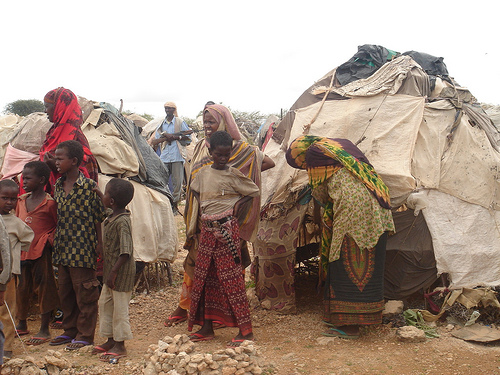Yesterday, I played a “disaster game”. It was part of an event organised by the Climate and Development Knowledge Network (CDKN), which has brought together development practitioners, students with unbelievable energy, and lawyers and economists that – like me – want to use our training innovatively to make a difference to people’s lives. Hence, the “disaster game”.
The game’s basic structure was as follows: each team had to pretend to be a community in a flood and drought prone area, and decide, over and over again, whether to pay for kit to protect ourselves from the disasters or spend money on things like education or health that would help us generate income and become more “resilient” to the disasters. If no disaster hit, everyone would be better off. But if a disaster hit, and we’d not invested in the special protective kit, we’d lose a lot of money.
My team found itself changing its strategy over time. First, we invested heavily in protective kit – to address our immediate vulnerability. Disaster hit. Phew – we’d been saved. But over time, as we got richer, we crossed a “tipping point” where it made more sense to invest in “resilience”, and keep trying to grow, rather than wait and worry about the next disaster.

It made me wonder whether there was such a stark difference between reducing vulnerability and enhancing resilience, and, if so, what the implications for DFID’s work are. So I got the dictionary out.
Vulnerability tends to refer to the capacity to be wounded. In economic terms, it can mean a country that is highly open to trade but dependent on just one or two exports, or highly dependent on strategic imports like oil or coal, and so on. If for some reason those imports or exports stop, or disaster hits somewhere, the country will suffer easily and hard. Many developing countries – including countries like Kenya where I was born – fall into this category. Many developed countries do as well – Japan is a sad, recent example. But vulnerable countries can also be very resilient.
Resilience derives from the Latin word “resile” – to leap back. So it’s about how quickly and easily a country recovers from a change or disaster – its flexibility. It’s not about avoiding or withstanding the disaster.
In most cases, the higher a country’s income, the more resilient it’s likely to be. And vice versa – the more flexible and resilient a country is, the more it’s likely to grow. A virtuous circle. But it’s also possible to exacerbate vulnerability by reducing resilience – for example, by bad environmental management, or holding a lot of debt, constraining the private sector, or having high levels of unemployment and unskilled labour. Such policies make it hard for a country to “bounce back”. A recent DFID-funded study called Promoting Economic Growth when the Climate is Changing therefore recommended a set of nine factors that enhance resilience and growth.
DFID is likely to lead in helping test and implement such policies. The department I work in has just been renamed the “Growth and Resilience Department”, and the recently published Humanitarian Emergency Response Review suggests that DFID should be focusing more on helping countries become resilient to a range of disasters and shocks – whether natural, food or energy-related.
This makes sense now, because many developing countries we work in are growing and may well be getting to “tipping points” like my team did in the disaster game. It also makes sense because there is increasing uncertainty about the nature and likelihood of disasters due to climate change. This increase in uncertainty reduces the benefit – the payoff – of investing in specific disaster protection or preparation measures, and increases the payoff of having more general resilience.
But reality is not a game. And people die in real-life disasters. For a vulnerable country like Kenya, it will be hard for politicians, individuals and DFID to stop worrying about managing oil dependency (currently around 25% of imports) or maintaining income from drought-prone tea production (hence DFID’s new collaboration with the Co-op to support Kenya’s tea farmers). But it will also be worth looking at broader measures like increasing income and employment opportunities for the youth in cities, investing in private sector development, and conserving natural resources.
Flexibility can make sense in real life as well as games.
